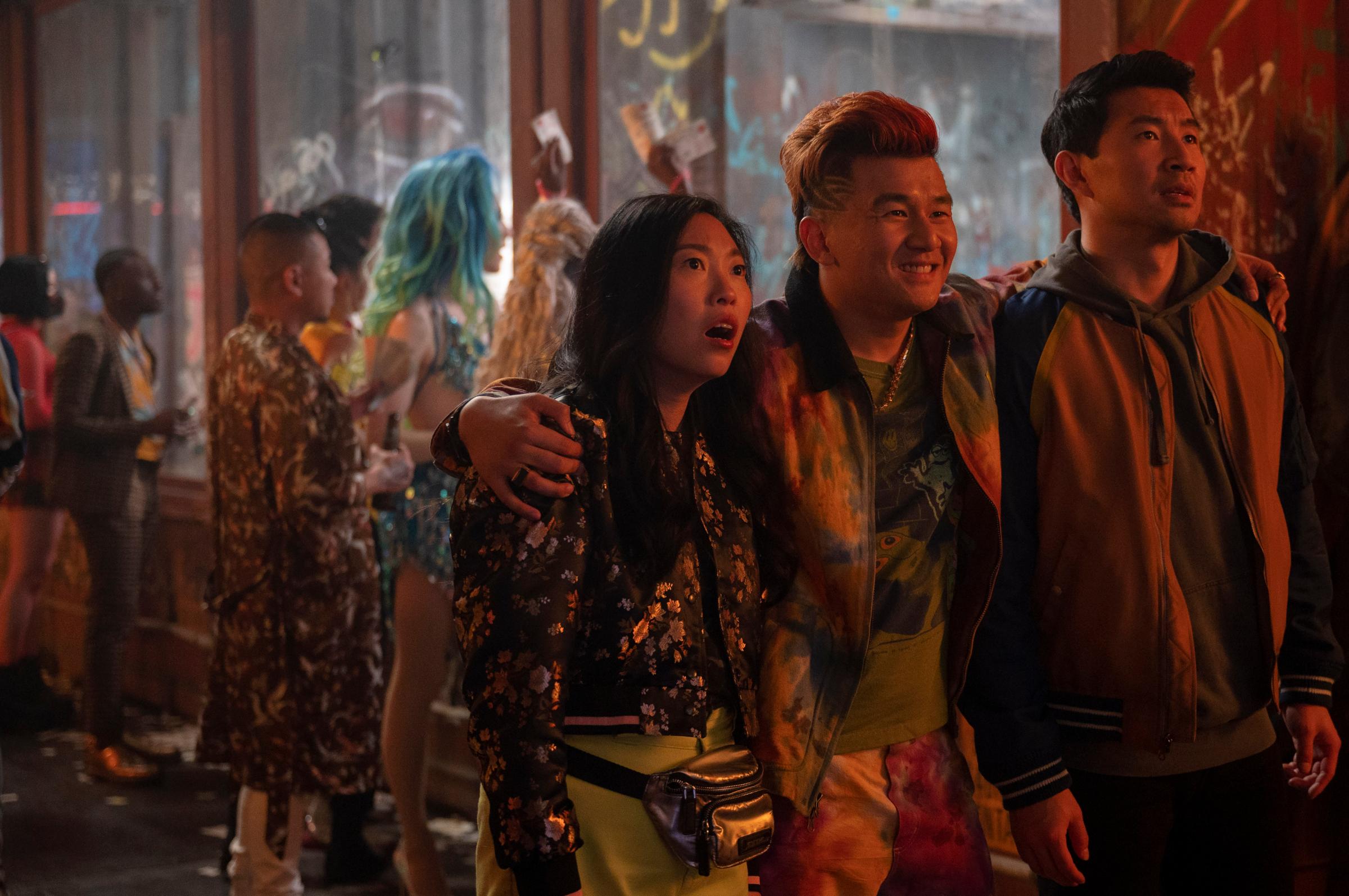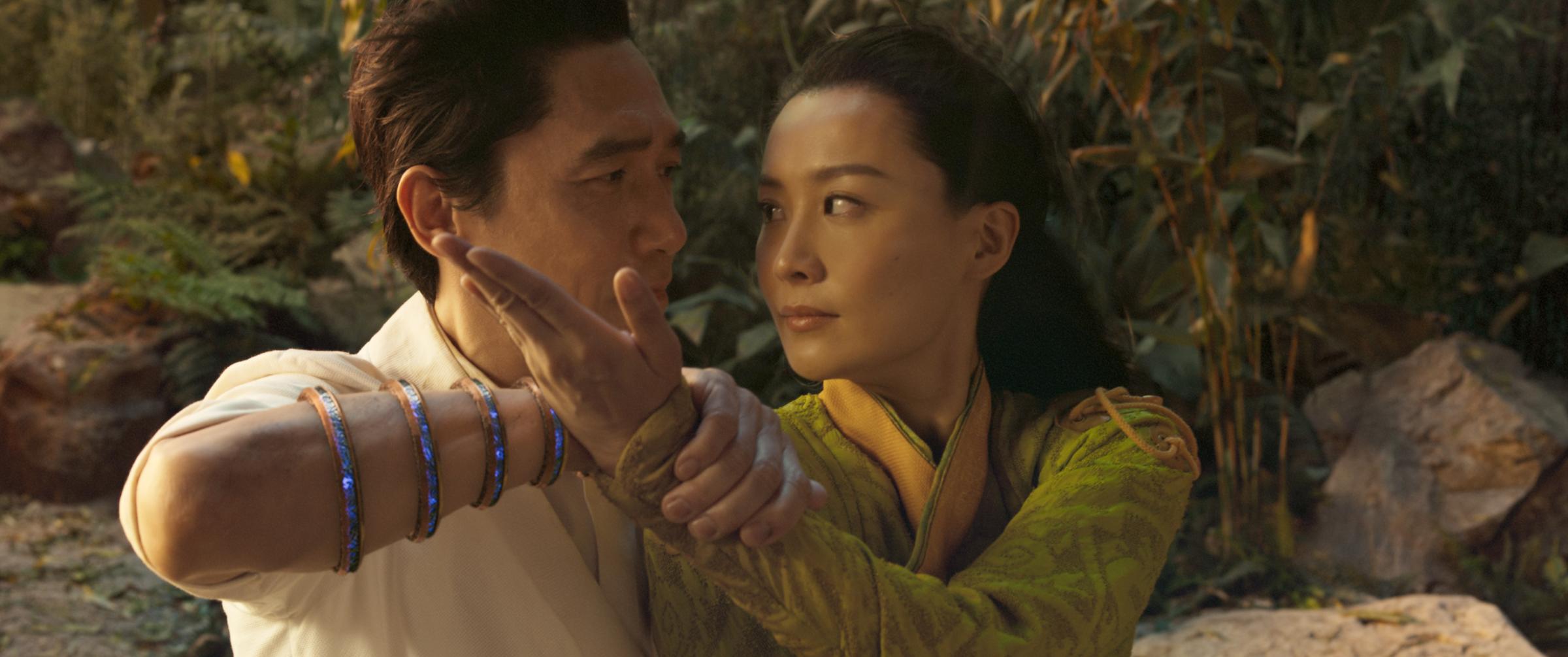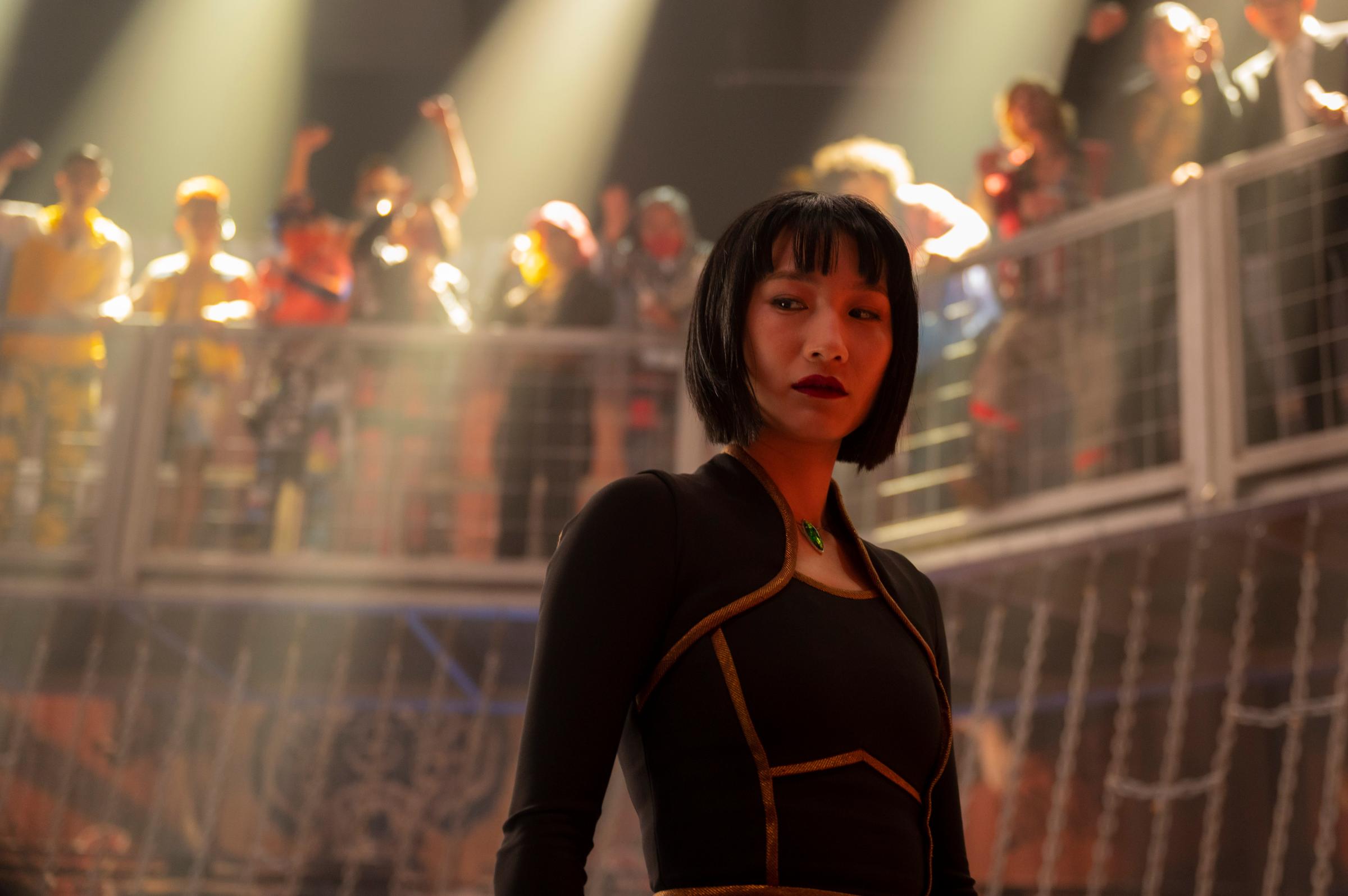It wasn’t a profound scene in Shang-Chi and the Legend of the Ten Rings that made me feel instantly connected to the film—not the Mandarin narration that opened the movie or even the early references to customs specific to Chinese culture like eating zhou, or congee, for breakfast and tomb-sweeping on the annual Qingming Festival. Of course, those storytelling choices told me that the latest Marvel superhero movie was crafted with viewers like me in mind. But it was a moment around 30 minutes in that let me know for certain I was watching my life experiences reflected on the big screen in a way Hollywood has rarely done: when Ronny Chieng’s character, Jon Jon, exclaims, “Wakao!”
This Mandarin word does not have a direct translation in English, though it could be likened to “damn.” It’s a term I grew up hearing in Taipei, Taiwan—where I spent the first 18 years of my life—and one I was told to use sparingly. I did not expect to hear it on the other side of the world, in a New York City theater, much less in a major production from Hollywood, whose projects centering Asian stories have been few and far between. As silly as it may seem, Jon Jon’s exclamation made me feel like I was in on an inside joke with the filmmakers.
It was just one of many knowing moments I experienced throughout Marvel’s first Asian-led superhero film, out in theaters Sept. 3. Directed by Destin Daniel Cretton (Just Mercy), Shang-Chi follows the titular character, played by Simu Liu, who leaves an ordinary life as a valet parker in San Francisco to confront the family legacy built by his estranged father Wenwu (Tony Leung)—both the leader of the Ten Rings crime organization and the owner of the ten rings with supernatural power to which its name refers. Heading into the movie, I knew from teasers that it would celebrate Asian culture through martial arts-inspired fight sequences and a soundtrack featuring artists of diverse Asian descent including Jhené Aiko, Rich Brian and Niki. What I didn’t anticipate was that the movie’s distinctly Chinese details would connect me to Shang-Chi in a way I’ve not experienced with any other blockbuster made in Hollywood.
I’ve been thinking about why representation in entertainment matters so much to me, as someone who grew up in Asia where I was not part of a minority group. It’s partly because I experienced such a drastic shift from regularly seeing faces and stories like my own on the screen throughout my childhood and adolescence, to barely seeing any in the past eight years since I moved to the U.S.—just one of many reasons I find comfort in watching Korean dramas and Japanese anime now. Then there’s the fact that series and films produced in Hollywood were a large part of my media diet growing up. Yes, I watched Taiwanese dramas. But I also always had Cartoon Network and the Disney Channel on, devouring shows from Mandarin-dubbed versions of Dexter’s Laboratory and The Powerpuff Girls to The Suite Life of Zack & Cody.
As for the Marvel Cinematic Universe, its superheroes have been a significant part of Taiwan’s pop culture—Avengers: Endgame broke opening day records in 2019 before becoming Taiwan’s second highest-grossing film of all time after Avatar, and MCU-themed action figures are ubiquitous. My fellow student government members and I dressed up to reenact the 2012 Avengers trailer for a back-to-school video. All of which is to say, I’ve experienced first-hand how Hollywood’s influences spread far and wide, for good and for ill, and know that Marvel is introducing its first Asian superhero not just to the U.S. but the world. Which is why it meant even more to see parts of my identity reflected onscreen, in this genre where there has been a glaring absence of Asian characters.

The film’s use of the Mandarin language, for starters, encompasses everything from slang to chengyu—idioms with roots in Chinese history that are primarily formed by four characters. In the opening scene, where Shang-Chi’s mother Jiang Li (Fala Chen) speaks of the origins of Wenwu and the ten rings, she describes him as having had the option to “cheng e yang shan” (懲惡揚善)—suppress evil and do good—but having chosen instead to use the weapon to conquer lands for his own gain. Hearing the expression brought me back to the classrooms of my Taiwanese elementary school, where memorizing pages upon pages of chengyu was part of the regular curriculum. And listening to a lengthy opening segment in Mandarin reminded me of hearing narrations of Chinese legends and tales while growing up, like when my brother and I crowded around the television to watch a cartoon adaptation of Xi You Ji, or Journey to the West, and savored every detail.
The film’s handling of Mandarin names also struck a chord, even in subtle instances, like when Shang-Chi calls his younger sister, Xialing (Meng’er Zhang), “Lingling” in a flashback scene. This small detail felt incredibly authentic, as nicknames in the Chinese community are commonly formed through doubling up on the final character. My full name is Meng Xiang Yue, and most of my extended family called me Yueyue throughout my childhood.
Then there are more obvious examples, as when Shang-Chi confesses to his best friend Katy (Awkwafina) that Shaun is not his actual name, but an alias he has used in the U.S. since leaving home. “Shang. Chi,” he enunciates slowly, repeating the first syllable after Katy, who does not speak Mandarin well, fails to get the sound right. He then spells it out in a last-ditch effort. The exchange made me recall all of my own attempts at teaching English-speaking friends how to say my Mandarin name during my years in the U.S. I am delighted when someone asks about this core part of my identity, but stumped when I try to answer. The truth is, there is no combination of English letters that would capture how to say many characters, including “Shang.” And that’s not even accounting for the tones—four pitched and one neutral—that accompany the characters. As someone accustomed to taking five or six attempts for the person I’m speaking with to reach 70% accuracy in pronouncing my name, Shang-Chi’s efforts felt deeply familiar.
One particular family interaction in Mandarin surprised me for how closely it reflected a common exchange in my life: When Jiang Li asks her children, Shang-Chi and Xialing, to go inside the house ahead of a pivotal confrontation. “I have to talk to the guests,” she tells them. In that moment, I knew the speech in this film was approached with care and intentionality. I can’t count the number of times the exact phrase in Mandarin, “wo gen ke ren you hua yao shuo” (“我跟客人有話要說”), was used by my parents when I was a kid. Especially in the presence of said guests, the line is code for: please leave the room, now.

That is not to say the language, and particularly the translation, isn’t without flaws. I chuckled at a signature Chinese liquor, baijiu, translated as “whiskey” in the subtitles, when the two are not the same. I raised an eyebrow at the aforementioned tomb-sweeping day, Qingming Festival, translated as “Day of the Dead”—which most commonly refers to the Mexican holiday Día de los Muertos. But despite these odd translations, I found the lines in my mother tongue to be thoughtfully infused with realistic expressions that helped create an intimate viewing experience.
Shang-Chi also impressed me with its portrayal of a family whose dynamics are rooted in values characteristic of Chinese culture. Most notably, the way in which Wenwu treats his son is the polar opposite of how he treats his daughter. Yes, the leader of the Ten Rings is harsh toward Shang-Chi—but at least they have a relationship. In contrast, a young Xialing watches her father beckon her brother toward martial arts training while she stands alone in the doorway. “Just nod. Don’t talk. He’ll forget you’re there,” Xialing tells Katy when they arrive in her childhood home. This is moments after her father, upon landing in the headquarters of his operation with both his children, announces, “My son is home. Take the girls to their room.”
The chengyu that sprang to my mind when viewing these interactions is zhong nan qing nü (重男輕女), which literally translates to “heavy male light female.” The saying refers to unequal treatment between genders and a patriarchal view of the world that has been prevalent in the history of Chinese society and through the teachings of scholars like Confucius. In the film, Xialing explains that Wenwu barely nods in her direction because he said she reminded him too much of her mother who is dead. This could be true, as a shot from a flashback shows the entire family, including Xialing, practicing martial arts forms together when Jiang Li was alive. But even with that reasoning, Wenwu’s dismissiveness toward his daughter is extreme. Given that the Ten Rings leader has lived for one thousand years (the rings offer immortality), his behavior can be at least partially explained by the traditional values that shaped him.
The zhong nan qing nü worldview has waned over time, and I thankfully grew up in a household where there was no major difference in how my younger brother and I were treated. But I see remnants of the bias in older generations of my family, with sons who have been favored and daughters often expected to support or follow rather than lead. That’s why I have a deep admiration for Xialing’s character, who refuses to stay in the shadows and takes up a weapon—a rope dart, to be exact—to train herself when there was no indication that Wenwu would. Being able to imagine the prejudice she faced, I cheered for Xialing all the more when she described the fight ring she had built, saying, “If my dad won’t let me into his empire, I’m going to build my own.”

In a recent Marvel featurette, Cretton said, “I wanted to look at what [a] superhero could be, what it would mean to me to be able to add not only one character, Shang-Chi, but to add a whole cornucopia of Asian faces that are representing something I’ve never seen before.” I can’t speak for how Asian viewers of other ethnicities will respond to the film—as it’s been said over and over again, the Asian American and Pacific Islander community is not a monolith. But as a Mandarin-speaking viewer who grew up in a home with Chinese values and traditions, I was moved by its efforts at portraying characters with experiences similar to my own. I also will have a different viewing experience from Asian Americans born and raised in the U.S. and from those who have lived in Asia for most of their lives.
But as someone with a bicultural, bilingual identity, it was refreshing to see the differences between the two experiences cleverly addressed with certain details. In one scene, Xialing, who lives in Macau, gives a measurement in meters and Katy, an American, responds, “What is that in feet”? In another, after Jon Jon, who also lives in Macau, speaks in Mandarin and Katy says she is not a fluent speaker, he switches to English and replies, “All good, I speak ABC.” The filmmakers don’t expand on the abbreviation, in another knowing wink to Asian American audiences who need no explanation on what it stands for: “American-born Chinese.”
In one of the shots of what appears to be Xialing’s childhood bedroom, a light pink graffiti-styled art piece on the wall reads wei xiao de mian ju (微笑的面具), which translates to “a mask for smiling” or “a smiling mask.” It’s a detail that, even if you read Mandarin, could be easily missed. The teaching of putting on a smile so as not to wear a sour look in public has been ingrained in me since I was a kid, and is intrinsic to the idea of saving face in Chinese culture. I am not the first to say that when it comes to representation, specificity creates authenticity. For me, it doesn’t get much more specific than small words in the background of a set bringing quick tears to my eyes as I recall myself as a girl, trying to hold them back.
More Must-Reads from TIME
- How Donald Trump Won
- The Best Inventions of 2024
- Why Sleep Is the Key to Living Longer
- How to Break 8 Toxic Communication Habits
- Nicola Coughlan Bet on Herself—And Won
- What It’s Like to Have Long COVID As a Kid
- 22 Essential Works of Indigenous Cinema
- Meet TIME's Newest Class of Next Generation Leaders
Contact us at letters@time.com